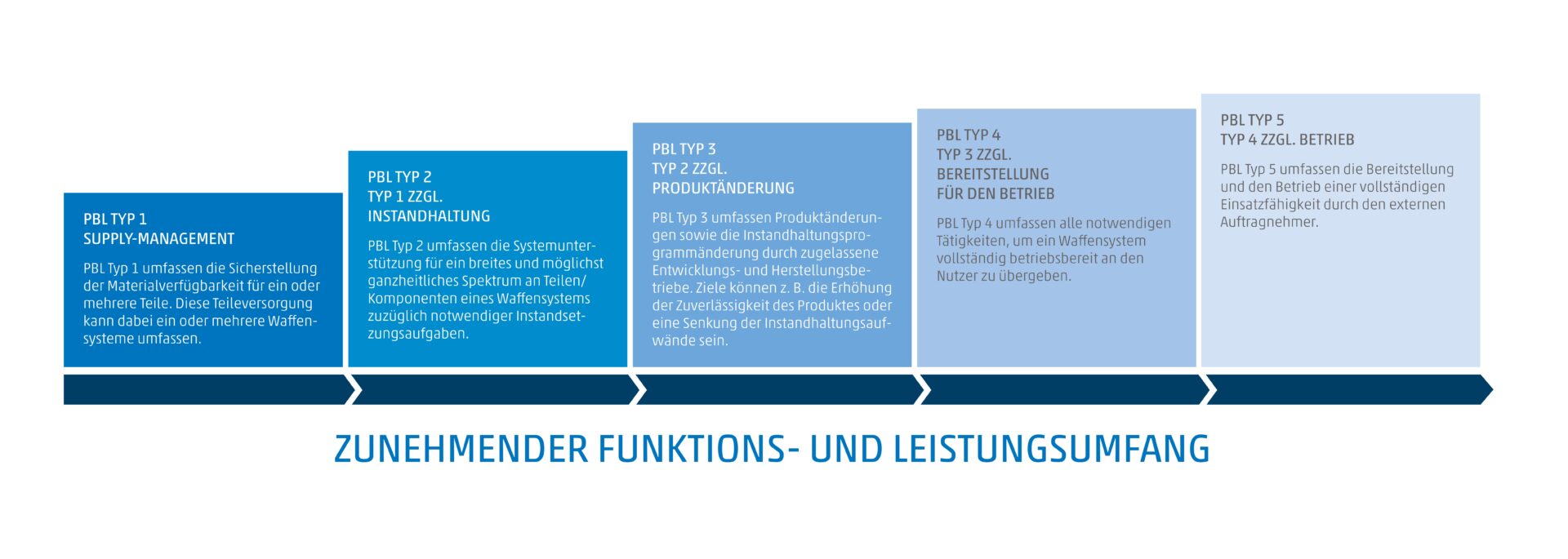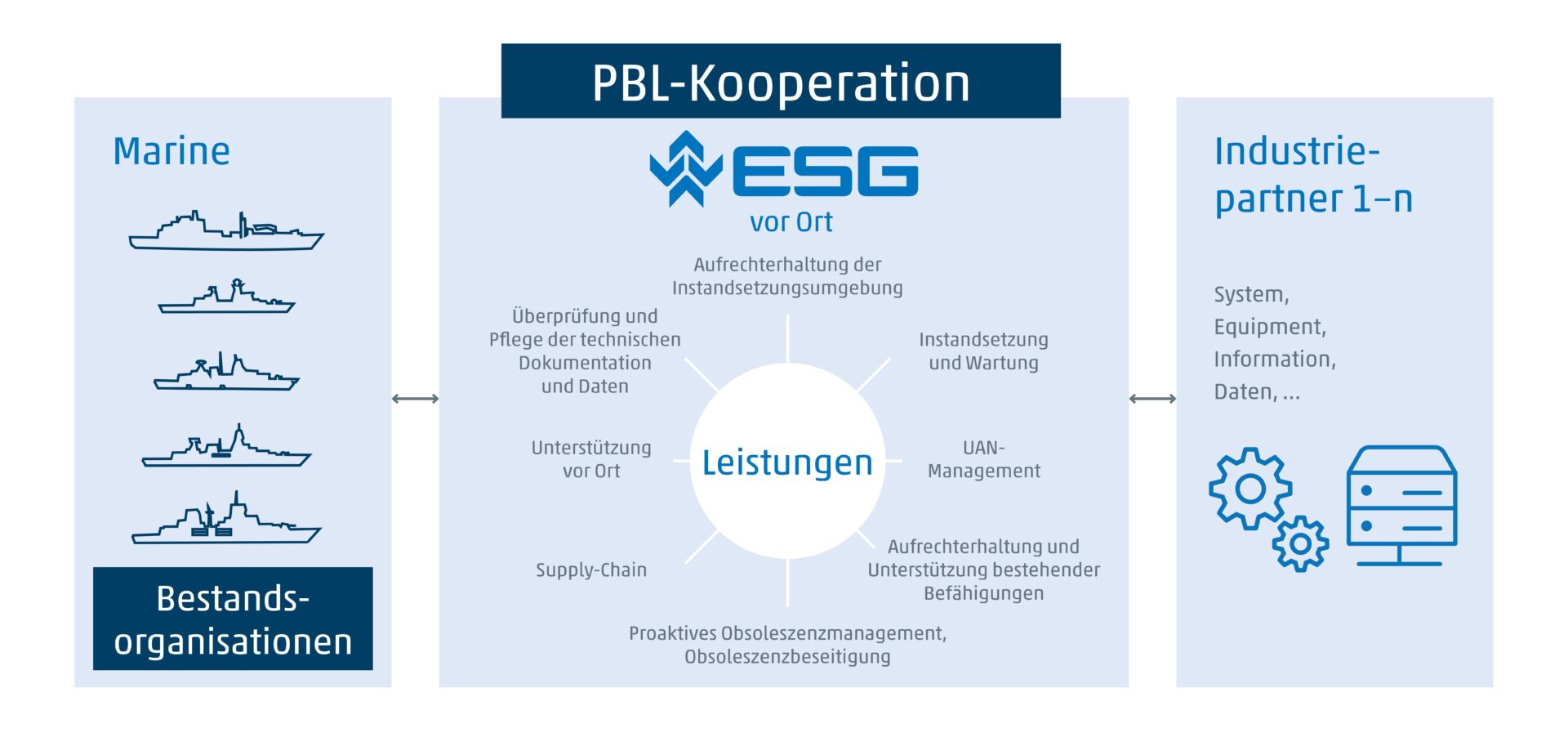"Do not stop a running system!" - is also a much-used slogan on board, signalling that a system must be and remain available and operational. From a logistics expert's perspective, ensuring and maintaining the availability of naval operational systems is an exciting and complex field.
The navy's systems, mission equipment and equipment remain in service for decades and are used intensively, sometimes to their technical limits. During this long service life, they are subject to constant change due to technical innovation cycles and changing operational conditions. This change is associated with risks that can jeopardise availability, the state of readiness and thus operational readiness.
The concept of Performance Based Logistics (PBL), on the other hand, can make a valuable contribution to ensuring the material and personnel operational readiness of the systems on board. In contrast to today's predominant principle of mostly reactive technical logistics support (TLB) or commissioning by means of maintenance framework agreements (IRV), PBL generates a high degree of proactive ownership, transparency and dynamism to achieve the jointly set goals.
What is Performance Based Logistics
It should be said in advance that PBL is not a panacea for all challenges. PBL focusses on how a system is supported and how this support is measured. In this way, a joint win-win approach is pursued that brings together the interdependent contracting parties in a co-operative form. Under PBL, the user benefits from continuously measurable and proven availability commitments, while the industry can rely on predictable, performance-related remuneration based on the increased responsibility assumed for system support. The basis for the success of PBL is mutual trust, very close cooperation on an equal footing and a clear structure and transparency in order processing right from the start.
Attention! Not all PBLs are the same; there is no "one size fits all" for a PBL contract. The following also applies: "Copy-and-paste contracts" are not appropriate or expedient, as the implementation of the PBL concept must be planned and set up for the specific case in a well-considered manner, with sufficient lead time and the appropriate effort. It is important to precisely define the system components to be supported or the required services and the objective (what do I want to achieve?) in advance. Precise delimitation and definition help to recognise risks and limit them in advance in a manageable way or even avoid them altogether. All those involved in the planned PBL process should be clear about which aspects are critical to the success of availability, i.e. which fields of action need to be considered and worked on with a particular focus.
Once you have agreed on the scope of the technology to be supported and the objective, you can start by analysing the current situation. Access to existing data, analyses and empirical values on the client side is an important success factor in order to be able to develop a suitable and targeted concept. The better and more complete the data quality is, the more accurately emerging risks and challenges can be identified and minimised with appropriate concept measures.
Based on the data situation and challenges identified in this way, concrete proposals can now be formulated for various PBL services and the KPIs (KPI = Key Performance Indicators) required for measurement - experience has shown that these are closely related to material availability and material supply. However, logistical support services such as ensuring and maintaining available and legally compliant technical documentation in conjunction with the associated material management data/SASPF master data and maintenance data should also be included. In addition, a proactive approach to obsolescence and configuration management contributes significantly to the increased availability of a weapon system.
All those with TLB experience in the readership will recognise a sense of déjà vu in this, but it must be made clear that, in contrast to the TLB contract, all components of a system, including all hardware components and the logistics services required for operation, can be provided within the framework of a PBL contract. In addition, the measured KPIs increase the transparency and personal responsibility of the PBL supplier with regard to service provision and the degree of fulfilment.
For example, material availability can be provided with fixed "on-time delivery" or "repair times" (KPI), measured, analysed and sanctioned with a penalty in the event of a deviation. Accordingly, a PBL supplier will have to move from a reactive to a much more active role, which in turn will help to increase availability. It is of paramount importance that all contracting parties (client, contractor and UAN) jointly define and contractually agree the services and associated KPI measurement methods on an equal footing. PBL is therefore not a "one-way ticket" according to the motto: client takes - contractor delivers! Instead, in a PBL relationship, all parties involved in the process make their respective contribution to the joint achievement of the agreed KPIs. All contracting parties work purposefully to increase availability; successes or failures become measurable and possible causes can be assigned. Performance Based Logistics is an integrative approach - the client and industry are jointly responsible for success.
Significance for the German Navy
Especially for mission-critical and availability-relevant systems/subsystems as well as mission equipment and furnishings, a PBL contract offers adequate freedom to define targeted and measurable services. The various forms and approaches that a PBL concept can take offer the navy the opportunity to concentrate on its core tasks and have logistical activities implemented by industry in a measurable, performance-related and autonomous manner. In view of the special characteristics of the navy (days at sea vs. lay days) and the associated need to maintain its own maintenance and repair capabilities and capacities, the targeted integration of available naval personnel such as shipboard personnel or naval arsenal teams to build up expertise is a key success factor for the success of a holistic PBL concept.
With its comprehensive expertise and decades of experience in connection with various PBL approaches and support projects, ESG makes important contributions to operational readiness and, as the national, reliable technology and innovation partner, stands firmly at the side of the German Navy so that the motto continues to be: Keep the system running!
Contact details:
ESG Elektroniksystem- und Logistik-GmbH
Wolfgang Klein
Senior Project Manager Marine Logistics








